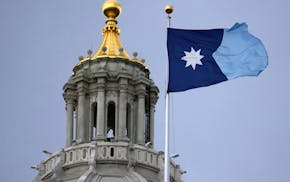Minnesota lawmakers will return to St. Paul Monday for a sprint special legislative session to pass a two-year $66 billion state budget.
Gov. Tim Walz and legislative leaders announced last week that they reached a budget agreement after failing to pass funding bills during their four-month-long regular session. The governor called the Minnesota Legislature back to the Capitol for a session that will begin at 10 a.m. and must adjourn by 7 a.m. Tuesday.
In that time, the Legislature — made up of 101 Democrats and 100 Republicans — must pass more than a dozen bills to fund state government over the next two years.
"In the very tight margins that we have, separated by just one (vote) ... this work truly reflects coming together in a bipartisan way," House Speaker Lisa Demuth, R-Cold Spring, said Friday.
Lawmakers have acknowledged as they worked on the budget that neither Republicans nor Democrats are completely happy with the deal, which required compromises from members of both parties. One such compromise will revoke health care from adult undocumented immigrants in Minnesota.
House Democratic Leader Melissa Hortman, of Brooklyn Park, said Friday it's not a provision Democrats would have chosen, but "we have to keep state government functioning."
"We have to keep funding for all the other people who get healthcare," Hortman said. "Certainly, undocumented adults are deserving of healthcare as well, but in order to get a budget agreement that funds the government for the state of Minnesota, this is a compromise that I was willing to make."
What's left to get done?
Lawmakers adjourned from their normal session on May 19 having passed only a handful of the bills that make up the state's $66 billion budget. While they had reached an agreement on topline spending in the state budget, they hadn't finished negotiating the finer points.
Since then, they've set and blown through multiple deadlines as leaders and committee chairs have worked to resolve differences on everything from transportation to health.
Leaders — including Demuth, Hortman and Senate Majority Leader Erin Murphy, DFL-St. Paul — have taken part in "hundreds of hours" of negotiations, Walz said Friday.
"Nothing ever completely broke down," Demuth said Friday. "It just took a little bit longer than we anticipated."
When they gavel in Monday, they'll start the work to debate and pass the rest of the state budget.
What will they debate?
Lawmakers need to pass bills to fund education, health, transportation, disability services and a host of other government functions.
Most controversially, they'll vote on removing adult undocumented immigrants from MinnesotaCare while allowing children to remain enrolled. They'll weigh cuts to human services in the hopes of slowing the rising cost to provide services to disabled Minnesotans.
One of the budget bills would extend unemployment insurance for more than 600 workers laid off from mines on the Iron Range, granting another 26 weeks of pay to workers at Ohio-based Cleveland-Cliffs facilities in Hibbing and Virginia.
A transportation bill provision would divert tens of millions of dollars yearly raised by a Twin Cities-area sales tax from counties to the Metropolitan Council.
Lawmakers will also weigh new guidelines for an influx of large-scale data centers to Minnesota.
And they'll weigh a package of infrastructure projects — called the "bonding bill" — valued at $700 million, including $250 million in investment in the state's roads and bridges.
How long will it take?
The special session is expected to last 21 hours, from 10 a.m. Monday to 7 a.m. Tuesday. In that time, lawmakers need to pass 14 bills, or a bill every 90 minutes.
To get a state budget passed within a day, lawmakers need to circumvent normal procedures, such as having multiple public hearings for bills. To do so, they need a supermajority of legislators to agree to suspend the rules in the House and Senate. Part of the negotiations over the last few weeks required ensuring they had enough votes to do so.
While Senate Minority Leader Mark Johnson, R-East Grand Forks, did not agree to the broad strokes budget deal Walz and other leaders struck in May, he signed onto the special session agreement following negotiations over the last few weeks. His caucus' support was needed to suspend the rules.
What's at stake?
Without a two-year budget, Minnesota would enter a partial government shutdown on July 1, resulting in the layoffs of thousands of public employees.
Already, the state had to warn hundreds of nurses they could be laid off if lawmakers can't reach an agreement. Lawmakers timed the special session in the hopes of avoiding having to send those notices to tens of thousands more state workers.
It's been two years since the Legislature last approved a bonding bill, meaning if they can't pass one this week, local governments and universities will be left again without public support to provide clean drinking water, improve facilities and rebuild roads and bridges.
Passing bonding requires a three-fifths majority in both the House and Senate, meaning it can't get done without bipartisan agreement.
Nathaniel Minor and Walker Orenstein of the Minnesota Star Tribune contributed to this story.
No plea deal expected as Sen. Nicole Mitchell appears today for burglary trial hearing

What to know about Trump's deployment of National Guard troops to LA protests

Man made guns and spoke of blowing up Minnesota Capitol, synagogue and other buildings, charges say

